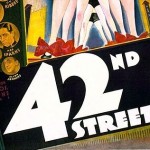 In 1927, Warner Brothers launched the era of talkies with The Jazz Singer, and studios scrambled to hire Broadway composers. Within a handful of years, screens were flooded with movie musicals, most of them hastily put through production, and audiences began to shrink. Hollywood released more than 100 “all-talking, all-singing” features in 1930, but only 14 in 1931. Public distaste for musicals became so great that studios even began cutting songs from Broadway adaptations like Cole Porter’s Fifty Million Frenchmen. The film credited with rescuing the movie musical is 42nd Street, particularly its last 20 minutes that showcase three drill-precision, kaleidoscopic dances by Busby Berkeley.
In 1927, Warner Brothers launched the era of talkies with The Jazz Singer, and studios scrambled to hire Broadway composers. Within a handful of years, screens were flooded with movie musicals, most of them hastily put through production, and audiences began to shrink. Hollywood released more than 100 “all-talking, all-singing” features in 1930, but only 14 in 1931. Public distaste for musicals became so great that studios even began cutting songs from Broadway adaptations like Cole Porter’s Fifty Million Frenchmen. The film credited with rescuing the movie musical is 42nd Street, particularly its last 20 minutes that showcase three drill-precision, kaleidoscopic dances by Busby Berkeley.
The film is adapted from a 1932 novel of the same name by Bradford Ropes, who had intended to write an “Uncle Tom’s Cabin of the chorus girl,” a story that would shed light on their exploitation and struggle for survival. The film took a different tone, highlighting the show business atmosphere for stagestruck youngsters intoxicated with theater. Whitney Bolton wrote the first treatment and worked with James Seymour on several screenplay drafts before he was replaced by Rian James.
Production began in October 1932, filming for 28 days at all three Warner Brothers facilities (the original Sunset studio, Vitagraph Studio in Hollywood, and old First National sound stages in Burbank), under the direction of Lloyd Bacon, who had replaced the ailing Mervyn LeRoy. The film marked Ruby Keeler’s screen debut and the first Warner feature for choreographer Berkeley and songwriters Harry Warren and Al Dubin. In addition to Keeler (Peggy), the film starred Warner Baxter (Julian), Bebe Daniels (Dorothy), and Dick Powell (Billy) and featured LeRoy’s girlfriend Ginger Rogers (Anytime Annie).
As a publicity stunt, a train called the “42nd Street Special” traveled from Hollywood to New York City for the film’s opening. Onboard were celluloid celebrities such as Joe E. Brown, Bette Davis, and Tom Mix (with his horse). The movie premiered on March 9, 1933, and went into general release two days later, becoming one of the most profitable features of the year, earning an estimated $2.3 million against a production cost of $340,000 to $439,000.
It ranked #2 on The Film Daily’s Ten Best list of 1933 and received Oscar nominations for Best Picture and Best Sound Recording. New York Times critic Mordaunt Hall called it “one of the most tuneful screen musical comedies that has come out of Hollywood,” while John Mosher of The New Yorker thought 42nd Street was “as pretty a little fantasy of Broadway as you may hope to see.” Variety’s review simply said, “It’ll socko the screen musical fans.”
Warner followed the film with a sequel of sorts: Gold Diggers of 1933, with 42nd Street alums LeRoy, Berkeley, Warren and Dubin, Keeler, Powell, and Rogers. Songs from both films provided the score for the 1980 stage adaptation of 42nd Street, produced by David Merrick and choreographed by Gower Champion, with Wanda Richert (Peggy), Jerry Orbach (Julian), Tammy Grimes (Dorothy), and Lee Roy Reams (Billy). The stage adaptation won the 1981 Tony Award for Best Musical and ran for 3,486 performances.
In 1998, the film was selected for preservation in the Library of Congress National Film Registry. In 2006, it ranked #13 on American Film Institute’s list of the Greatest Movie Musicals. On AFI’s 100 Songs, “42nd Street” ranked #97, while the line “Sawyer, you’re going out a youngster, but you’ve got to come back a star!” ranked #87 on AFI’s 100 Movie Quotes.
To hear the score, look for the soundtrack recording from Soundtrack Factory or listen to the original Broadway cast recording. The film is available in Blu-ray, DVD, and digital formats from Warner. For more about the making of the film, read the 1980 Wisconsin Press edition of the screenplay, edited by Rocco Fumento.
NEXT, look for Love Me Tonight (1932), a landmark in musical film editing, with a score by Broadway songwriters Richard Rodgers and Lorenz Hart, starring Maurice Chevalier and Jeanette McDonald. The full soundtrack isn’t available, but “Isn’t It Romantic?” and “Love Me Tonight” are on the album Change Partners. The film is available on DVD from Universal.
THEN, listen to Snow White and the Seven Dwarfs (1937), the first full-length animated musical film, with songs by Disney studio writers Frank Churchill and Larry Morey, including the iconic “Someday My Prince Will Come.” The film is available in various video formats from Disney and streaming on Disney+.
